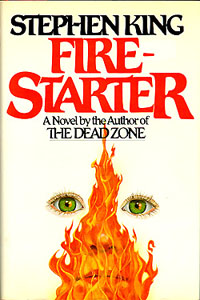
Limited Edition Information
| Firestarter |
|---|
 |
|
Publication Information
Limited Edition Information
|
With Firestarter, King again returns to the notion of "wild talents," a subject that has fascinated him since Carrie. In his earliest novels, the question of why these talents exist is barely addressed – in both Carrie and The Shining, psychic (or "psi") powers are simply inherent in the children who possess them. With The Dead Zone, King attempted an explanation for Johnny Smith's abilities, indicating that portions of his brain had been damaged, allowing others to emerge. King explores the link between the brain and these talents even further in Firestarter, suggesting that psi talents can be awakened through artificial chemicals. In college, Charlie McGee's parents Andy and Vicky subject themselves to a test of the experimental drug Lot Six, administered by a government agency known as The Shop. Andy comes away from the test with mild mental domination, what he calls a push; Vicky's emergent talent extends no further than an even milder form of telekinesis. Their daughter Charlie, however, inherits their expanded capacities in an entirely new way; she is inborn with ability to start fires with her mind – pyrokinesis.
Not a horror novel in any specific sense, Firestarter borders on mainstream, with a science fiction backdrop and some horrific elements peppered throughout. Government paranoia – which had defined the first third of The Stand and the last third of The Dead Zone – resurfaces here, woven throughout the narrative. Andy, a literature professor before going on the run, compares The Shop with Orwell's all-powerful government in 1984. Indeed, Firestarter is King's most potent examination of these themes in a mainstream novel; among King's novels, only The Running Man (more strictly set in an inclusive science fiction universe) goes further.
Both 'Salem's Lot and The Shining addressed King's interest in surrogate fathers. While in those books, Ben Mears and Dick Hallorann emerge as heroes, in Firestarter, the motif is twisted. John Rainbird, a disfigured Shop agent and hitman, replaces Andy McGee as the central influence in Charlie's life. Insinuating himself into Charlie's life, Rainbird conceals his true motives – coercion, manipulation, and eventually murder. Adding a further element of dread is the increasingly romantic/sexual cant of Rainbird's admiration of Charlie. Both he and her father tell her they love her in their final words, but Rainbird follows his declaration by attempting to kill her. This type of damaging father/father figure recurs symbolically in "Apt Pupil," and more literally in It, Gerald's Game, and Dolores Claiborne.
King's use of symbolic names in his early career is interesting: names such as Jack Torrence (pronounced as "torrents," suggesting both storms and violence), Randall Flagg (representing a decimated America), and even Carrie White (signifying virginity or innocence) are open for interpretation. In The Dead Zone, King's use of the name John Smith moved closer to specificity; we understand that he is supposed to represent Everyman. Similarly, Charlie's name is obvious – the definition of char is "to burn." King would later extrapolate on this in the Dark Tower novels. In The Waste Lands, we are told that char literally means death. In Wizard & Glass, the phrase charyou tree is chanted as an important character is burned at the stake. It's no mistake that Charlie's main opponent is John Rainbird; the job of water is to extinguish fire.
Boys' coming of age stories are frequent in King's canon: 'Salem's Lot, The Talisman, Hearts In Atlantis, Christine, The Gunslinger and The Waste Lands, The Eyes of the Dragon, and especially "The Body" all feature elements of the archetype. Firestarter is unusual in exploring a girls' coming of age story. While Carrie approached these themes and the larger scope of It includes Beverly Marsh's story, it is only with the much later adventure novel The Girl Who Loved Tom Gordon that King fully returned to this genre.
Charlie McGee's growth is systematic: her parents initially try to train her to avoid using her powers at all costs ("instilling a complex," one character says, no different than toilet training), but by necessity her father allows her to start fires in extreme circumstances. Charlie's capture by The Shop hones her powers and teaches her to use them more effectively. In some ways, this parallels the situation in Misery, in which incarceration and a forced use of talent actually improves the person being held. One wonders what might have happened if Carrie White would have been trained similarly. While Charlie McGee's wreckage at the end of the novel parallels the events of Carrie White's Black Prom, it is tempered here by a more sophisticated moral code and Charlie's more targeted use of her abilities.
Though the tone is at times claustrophobic, the pace never slows, even during sequences in The Shop that should seem static. Scenes in which Charlie uses her powers reach the same satisfying intensity as Danny Torrance's psychic flashes in The Shining, Johnny Smith's visions in The Dead Zone, and Carrie White's telekinetic bursts. Importantly, though, King does not allow these sequences to overshadow the characters he's built, each instilled with complex personalities (Firestarter is almost unique in making the villains seem almost as interesting as the heroes). Continuing the shift away from traditional horror begun in The Dead Zone and continuing on into Cujo and Different Seasons, Firestarter is instantly involving, representing King at his most readily accessible.